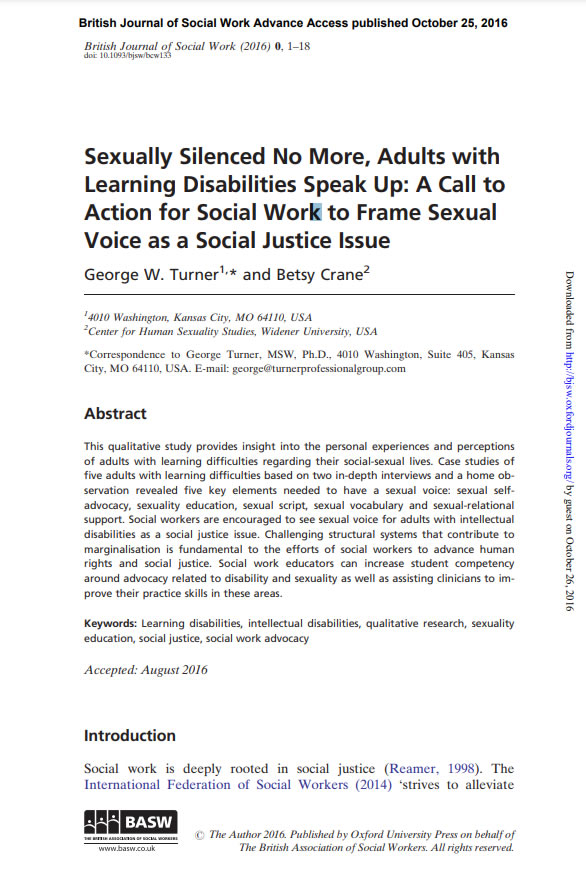Utilizing the art of storytelling to illuminate the lived experience of individuals, families, communities, and workplaces.
As a sexual health scholar...
Dr Turner is dedicated to combining empirical and conceptual analyses to shift attention away from individual-focused models of sexual risk and toward the systemic roots of sexual health inequities. HIs publications examine access to health care, and limited or no sex education especially for marginalized communities.

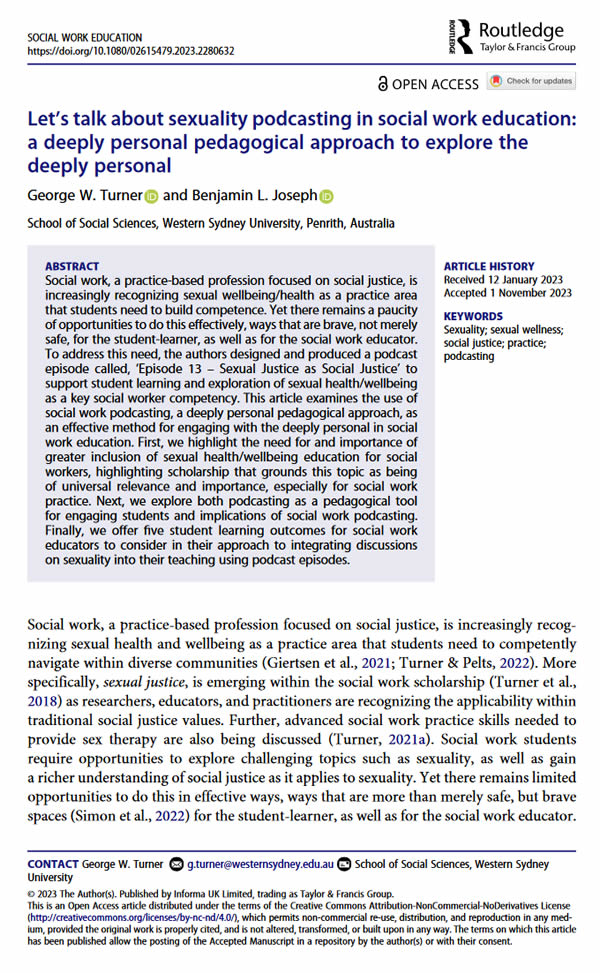 Lets Talk About Sexuality Podcasting in Social Work Education: A Deeply Personal Pedagogical Approach to Explore the Deeply Personal, Social Work Education.
Lets Talk About Sexuality Podcasting in Social Work Education: A Deeply Personal Pedagogical Approach to Explore the Deeply Personal, Social Work Education.
Turner, G.W. & Joseph, B. (2023)
Social work, a practice-based profession focused on social justice, is increasingly recognizing sexual wellbeing/health as a practice area that students need to build competence. Yet there remains a paucity of opportunities to do this effectively, ways that are brave, not merely safe, for the student-learner, as well as for the social work educator. To address this need, the authors designed and produced a podcast episode called, ‘Episode 13 – Sexual Justice as Social Justice’ to support student learning and exploration of sexual health/wellbeing as a key social worker competency.
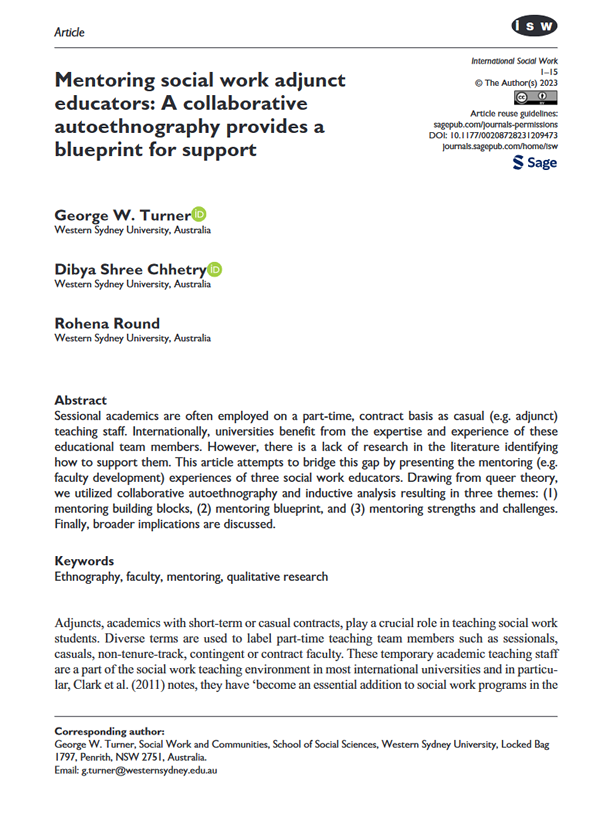 Mentoring social work adjunct educators: A collaborative autoethnography provides a blueprint for support
Mentoring social work adjunct educators: A collaborative autoethnography provides a blueprint for support
Turner, Chhetry, D., Round, R. (2023).
Sessional academics are often employed on a part-time, contract basis as casual (e.g. adjunct) teaching staff. Internationally, universities benefit from the expertise and experience of these educational team members. However, there is a lack of research in the literature identifying how to support them. This article attempts to bridge this gap by presenting the mentoring (e.g. faculty development) experiences of three social work educators.
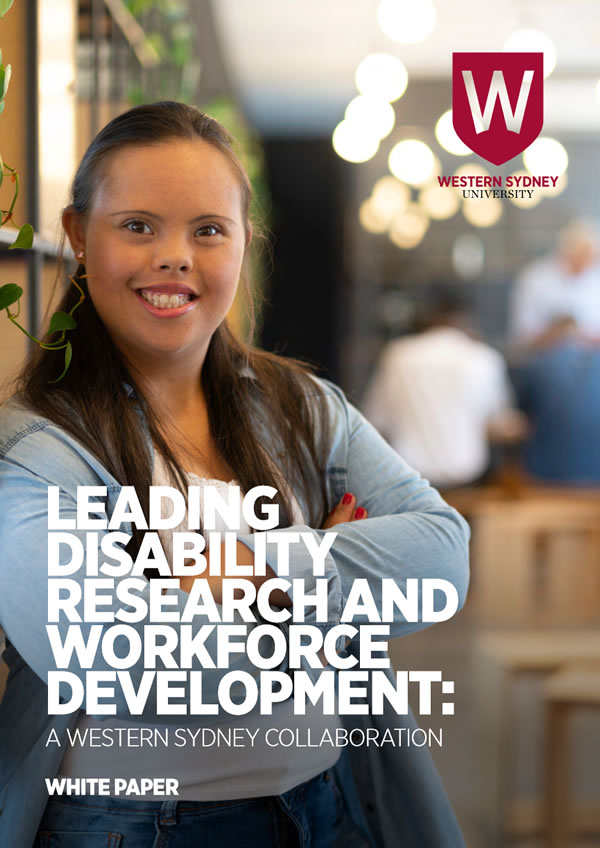 Leading disability research and workforce development: A Western Sydney collaboration. Western Sydney University.
Leading disability research and workforce development: A Western Sydney collaboration. Western Sydney University.
Tracey, D., Mills, C., Mogensen, L., Avery, S., Bye, R., Cooper, H., Fava, G., Gillespie, A., Hastas, C., Johnston, C., Mach, K., Nketsia, W., Scobie, J., Staples, K., Turner, G., & Wilson, N. J. (2023).
Human sexuality courses are offered at most universities. Students often bring a breadth of experiences and a
need for emotional processing of these narratives into these courses as it relates to course content. The purpose of this study was to expand research exploring emerging adults’ sexuality narratives to be inclusive of positive stories.
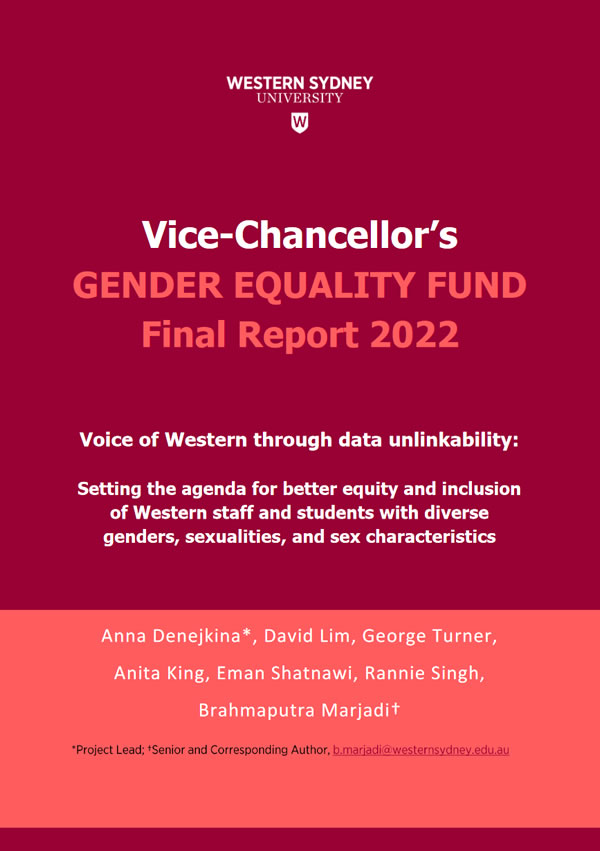 Vice-Chancellor’s GENDER EQUALITY FUND Final Report 2022
Vice-Chancellor’s GENDER EQUALITY FUND Final Report 2022
Denejkina, A., Lim, D., Turner, G.W., King, A., Shatnawi, E., Singh, R., Marjadi, B. (2023). Voice of Western through data unlinkability: Setting the agenda for better equity and inclusion of Western staff and students with diverse genders, sexualities, and sex characteristics. Vice-Chancellor’s Gender Equality Fund Final Report 2022. Western Sydney University, Penrith, NSW.
Voice of Western through data unlinkability: Setting the agenda for better equity and inclusion of Western staff and students with diverse genders, sexualities, and sex characteristics
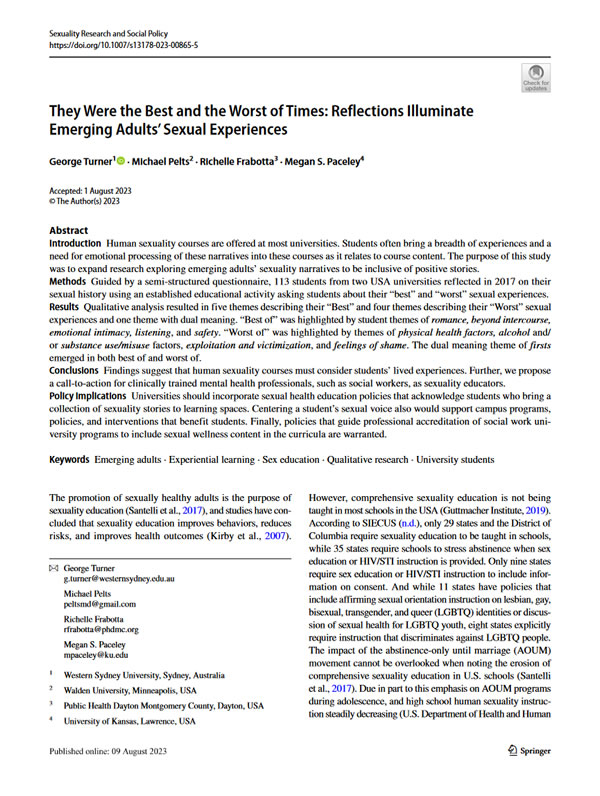 They were the best of times; they were the worst of times: Student narratives of their sexual experiences emphasize a critical need for sexuality courses, Journal of Sexuality Research and Social Policy.
They were the best of times; they were the worst of times: Student narratives of their sexual experiences emphasize a critical need for sexuality courses, Journal of Sexuality Research and Social Policy.
Turner, G. W., Pelts, M, Frabotta, R. Paceley, M. (2023).
Human sexuality courses are offered at most universities. Students often bring a breadth of experiences and a
need for emotional processing of these narratives into these courses as it relates to course content. The purpose of this study was to expand research exploring emerging adults’ sexuality narratives to be inclusive of positive stories.
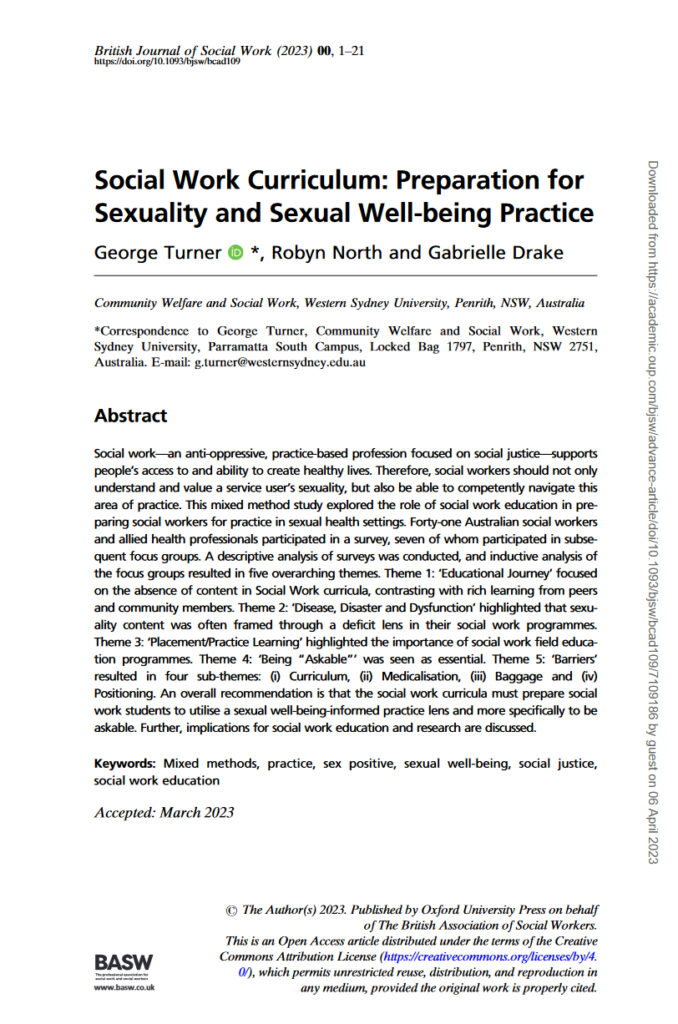 Social Work Curriculum: Preparation for Sexuality and Sexual Well-being Practice
Social Work Curriculum: Preparation for Sexuality and Sexual Well-being Practice
George W. Turner, Robyn North, and Gabrielle Drake (2023)
Social work—an anti-oppressive, practice-based profession focused on social justice—supports people’s access to and ability to create healthy lives. Therefore, social workers should not only understand and value a service user’s sexuality, but also be able to competently navigate this area of practice. This mixed method study explored the role of social work education in preparing social workers for practice in sexual health settings. Forty-one Australian social workers and allied health professionals participated in a survey, seven of whom participated in subsequent focus groups.
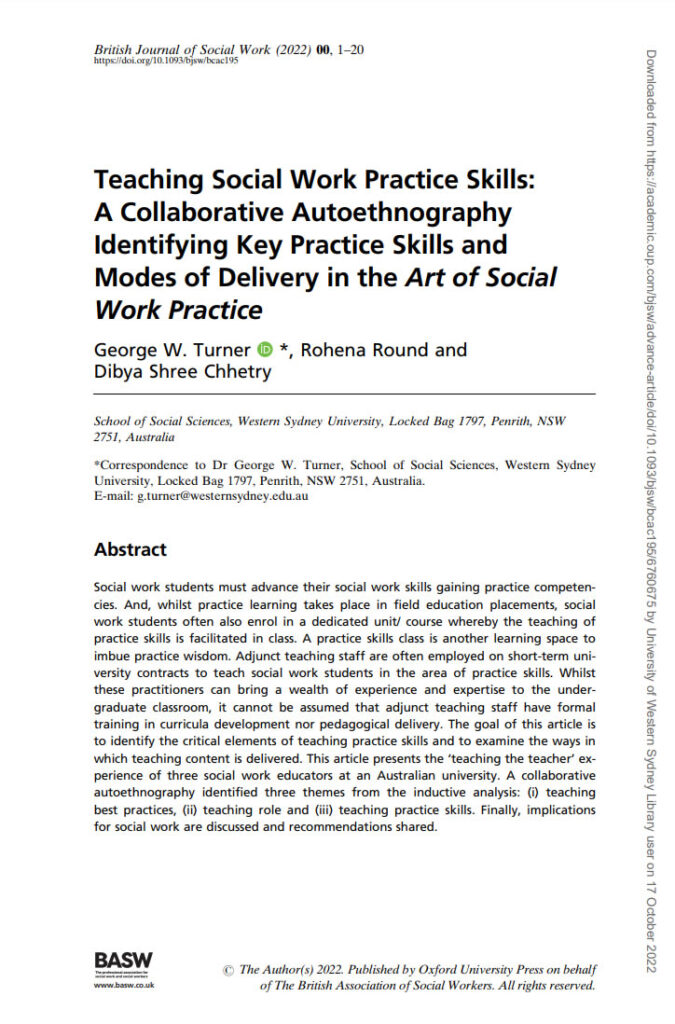
George W. Turner, Rohena Round and Dibya Shree Chhetry (2022)
Social work students must advance their social work skills gaining practice competencies. And, whilst practice learning takes place in field education placements, social work students often also enrol in a dedicated unit/ course whereby the teaching of practice skills is facilitated in class. A practice skills class is another learning space to imbue practice wisdom. Adjunct teaching staff are often employed on short-term university contracts to teach social work students in the area of practice skills. Whilst these practitioners can bring a wealth of experience and expertise to the undergraduate classroom, it cannot be assumed that adjunct teaching staff have formal training in curricula development nor pedagogical delivery.
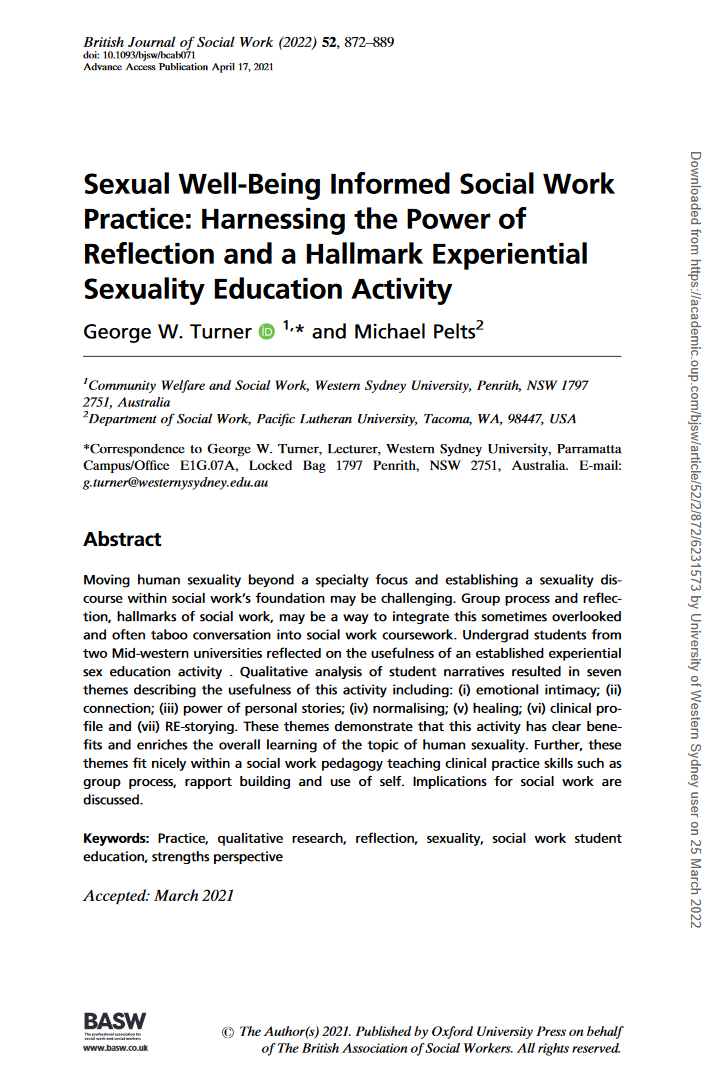
George W. Turner, and Michael Pelts (2022)
Moving human sexuality beyond a specialty focus and establishing a sexuality discourse within social work’s foundation may be challenging. Group process and reflection, hallmarks of social work, may be a way to integrate this sometimes overlooked and often taboo conversation into social work coursework. Undergrad students from two Mid-western universities reflected on the usefulness of an established experiential sex education activity.
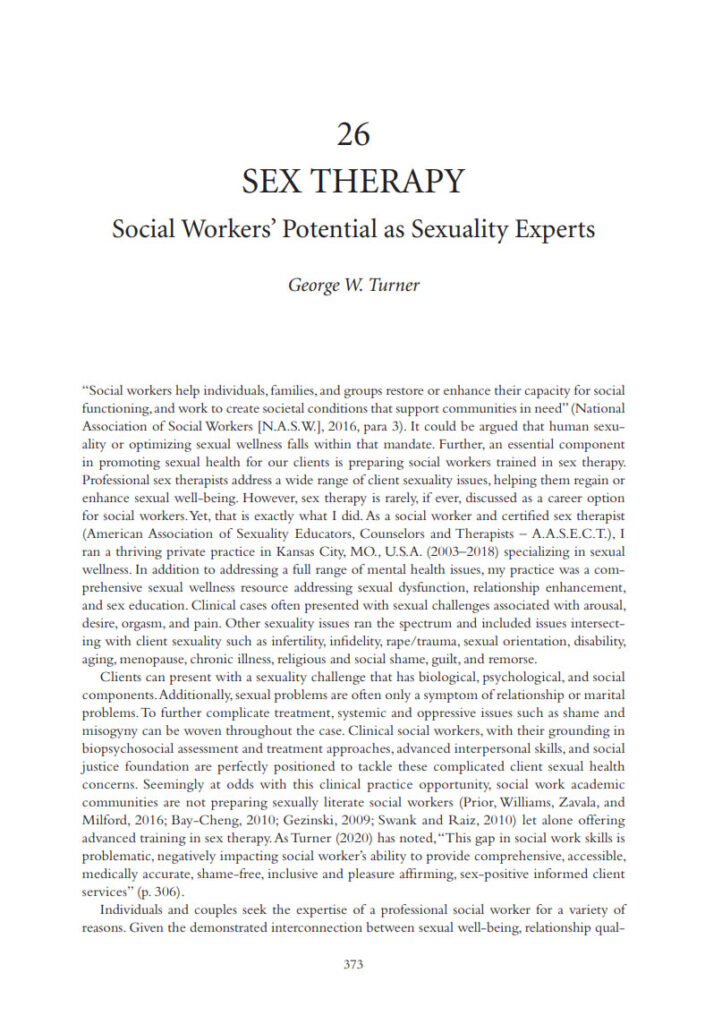
SEX THERAPY Social Workers’ Potential as Sexuality Experts
George W. Turner (2021)
Social workers help individuals, families, and groups restore or enhance their capacity for social functioning, and work to create societal conditions that support communities in need” (National Association of Social Workers [N.A.S.W.], 2016, para 3). It could be argued that human sexuality or optimizing sexual wellness falls within that mandate. Further, an essential component in promoting sexual health for our clients is preparing social workers trained in sex therapy. Professional sex therapists address a wide range of client sexuality issues, helping them regain or enhance sexual well-being.
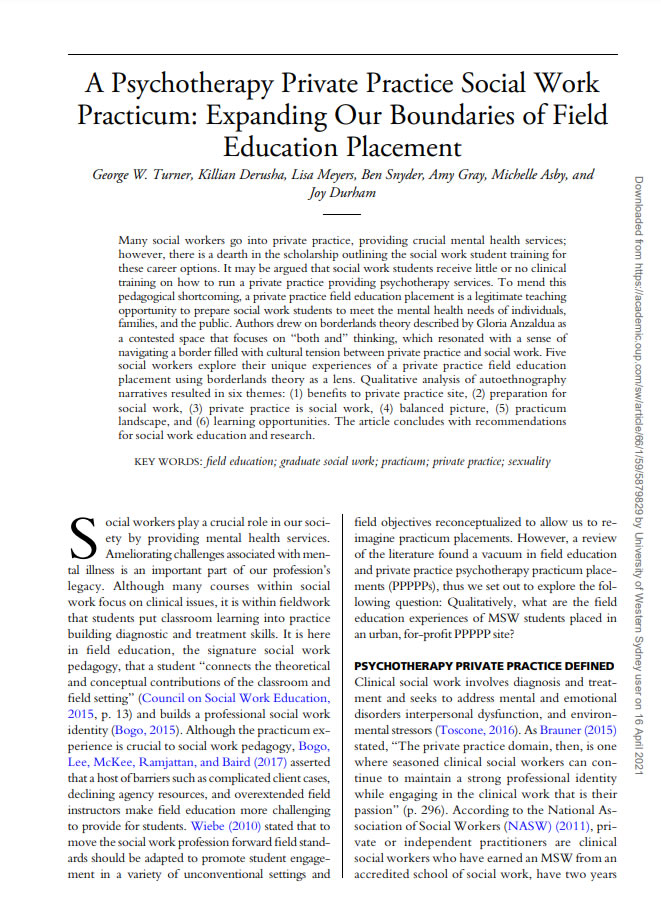
George W. Turner, Killian Derusha, Lisa Meyers, Ben Snyder,
Amy Gray, Michelle Asby, and Joy Durham (2021)
Many social workers go into private practice, providing crucial mental health services; however, there is a dearth in the scholarship outlining the social work student training for these career options. It may be argued that social work students receive little or no clinical training on how to run a private practice providing psychotherapy services. To mend this pedagogical shortcoming, a private practice field education placement is a legitimate teaching opportunity to prepare social work students to meet the mental health needs of individuals, families, and the public. Authors drew on borderlands theory described by Gloria Anzaldua as a contested space that focuses on “both and” thinking, which resonated with a sense of navigating a border filled with cultural tension between private practice and social work. Five social workers explore their unique experiences of a private practice field education placement using borderlands theory as a lens.
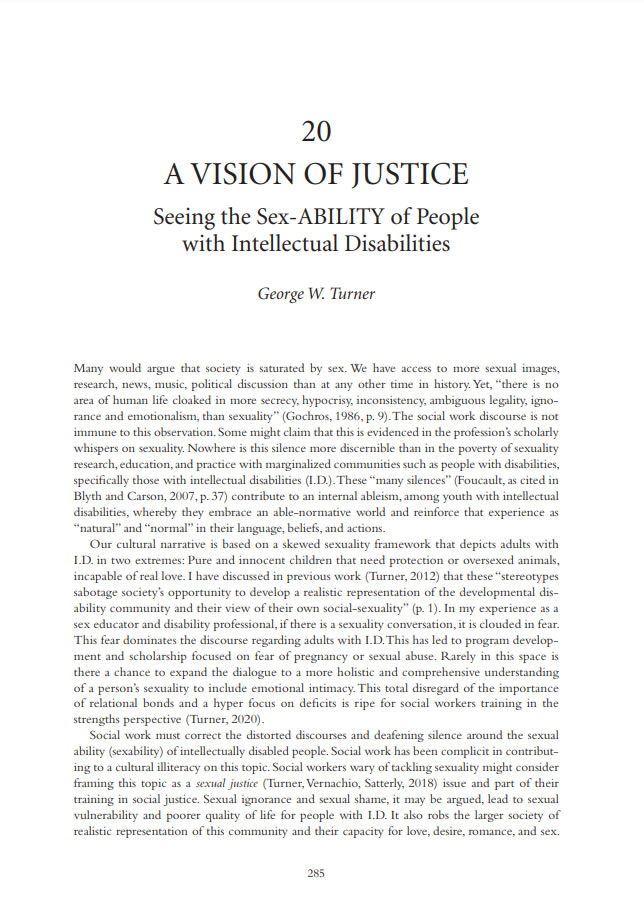
A VISION OF JUSTICE: Seeing the Sex-ABILITY of People with Intellectual Disabilities
George W. Turner (2021)
Many would argue that society is saturated by sex. We have access to more sexual images, research, news, music, political discussion than at any other time in history. Yet, “there is no area of human life cloaked in more secrecy, hypocrisy, inconsistency, ambiguous legality, ignorance and emotionalism, than sexuality” (Gochros, 1986, p. 9). The social work discourse is not immune to this observation. Some might claim that this is evidenced in the profession’s scholarly whispers on sexuality.
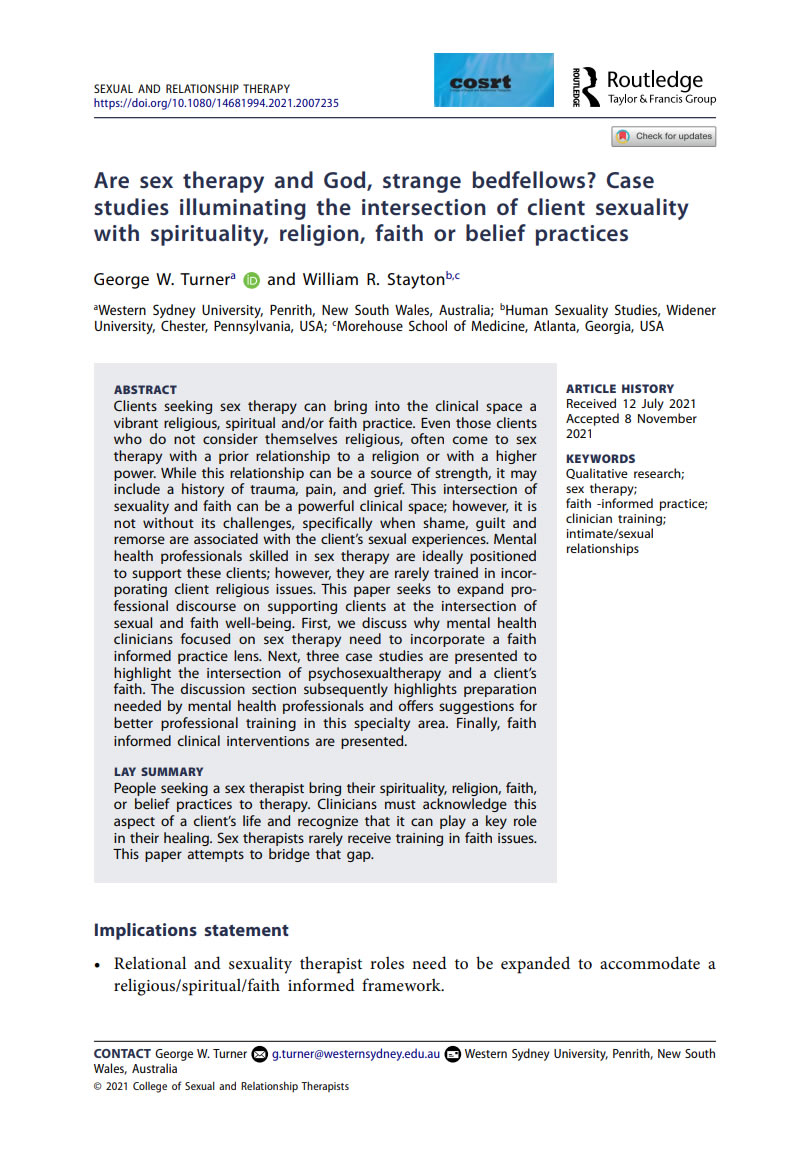
George W. Turner amd William R. Stayton (2021)
Clients seeking sex therapy can bring into the clinical space a vibrant religious, spiritual and/or faith practice. Even those clients who do not consider themselves religious, often come to sex therapy with a prior relationship to a religion or with a higher power. While this relationship can be a source of strength, it may include a history of trauma, pain, and grief. This intersection of sexuality and faith can be a powerful clinical space; however, it is not without its challenges, specifically when shame, guilt and remorse are associated with the client’s sexual experiences. Mental health professionals skilled in sex therapy are ideally positioned to support these clients; however, they are rarely trained in incorporating client religious issues.
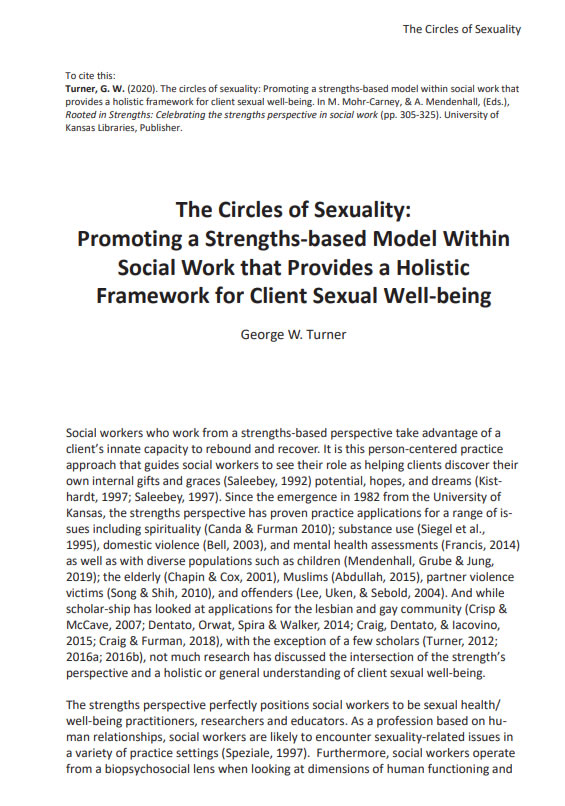
George W. Turner (2020)
Sexual and gender minority (SGM) youths face risks due to growing up with stigmatized identities. SGM organizations minimize these risks by reducing isolation, promoting positive identity development, and providing access to supportive resources. However, nonmetropolitan SGM youths may have high risks with low access to SGM organizations. Little research has been conducted on nonmetropolitan SGM organizations. This study utilized in-depth interviews and openended survey items to explore the factors limiting SGM youths’ involvement in nonmetropolitan SGM organizations. Findings revealed three factors limiting involvement: accessibility, utility, and stigma. Implications for future research and practice with SGM youths are discussed.
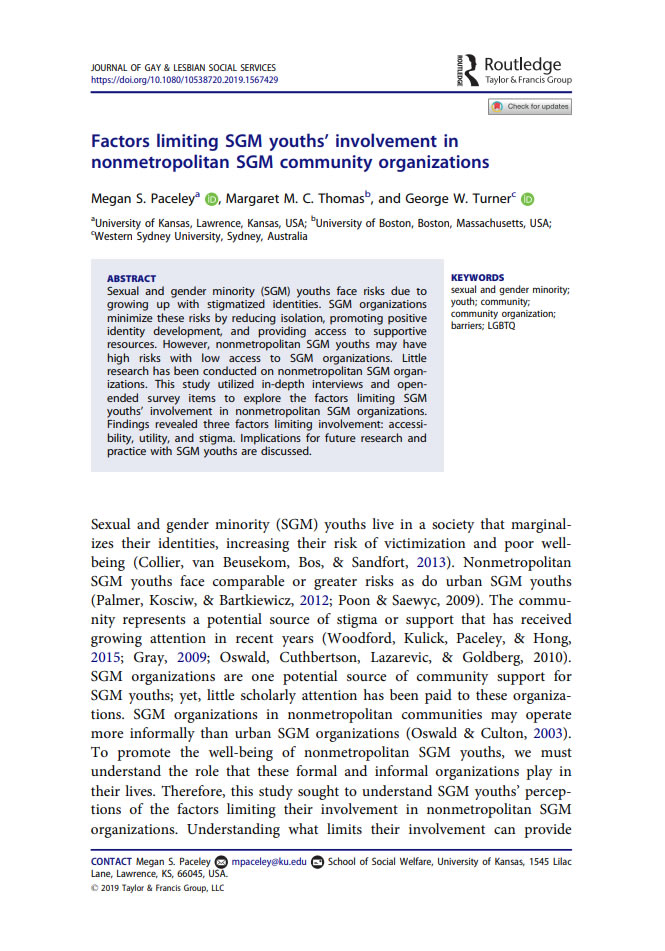
Factors limiting SGM youths’ involvement in non-metropolitan SGM community organizations
Megan S. Paceley , Margaret M. C. Thomas and George W. Turner (2019)
Sexual and gender minority (SGM) youths face risks due to growing up with stigmatized identities. SGM organizations minimize these risks by reducing isolation, promoting positive identity development, and providing access to supportive resources. However, nonmetropolitan SGM youths may have high risks with low access to SGM organizations. Little research has been conducted on nonmetropolitan SGM organizations. This study utilized in-depth interviews and openended survey items to explore the factors limiting SGM youths’ involvement in nonmetropolitan SGM organizations. Findings revealed three factors limiting involvement: accessibility, utility, and stigma. Implications for future research and practice with SGM youths are discussed.
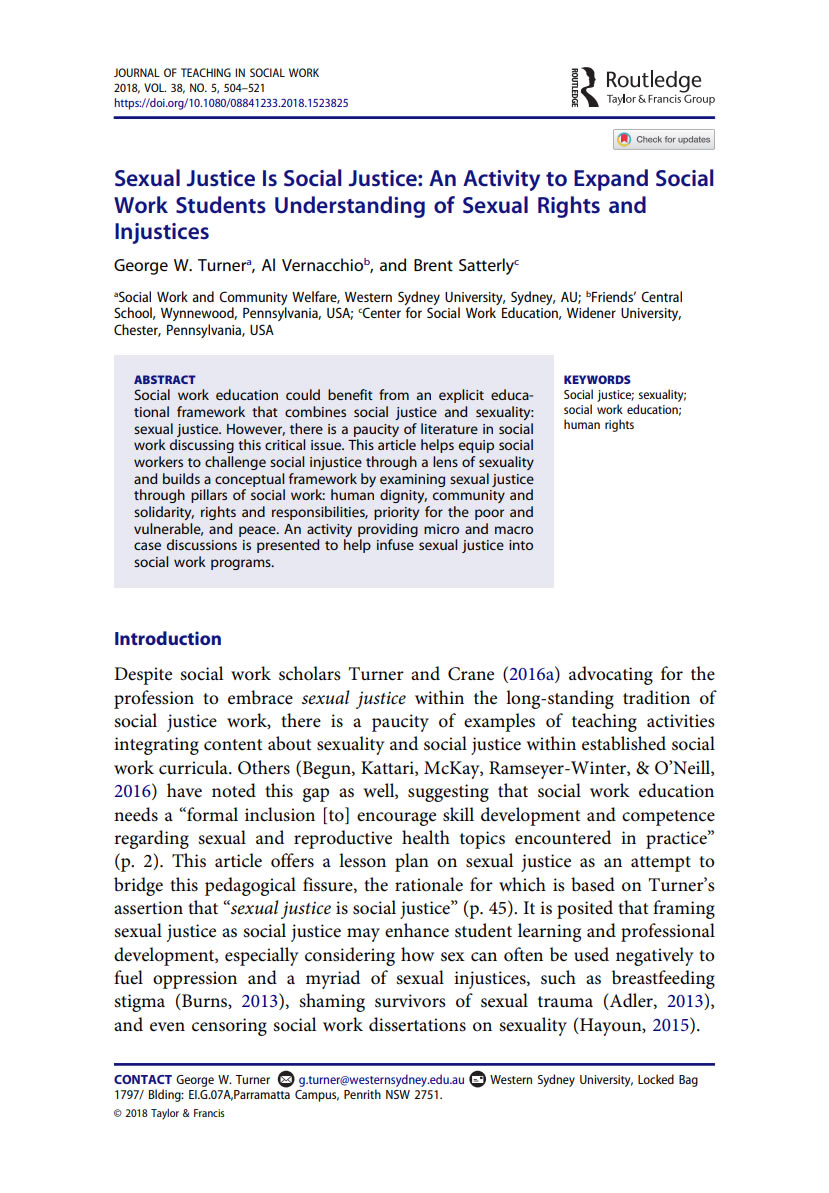
George W. Turner, Al Vernacchio and Brent Satterly (2018)
Social work education could benefit from an explicit educational framework that combines social justice and sexuality: sexual justice. However, there is a paucity of literature in social work discussing this critical issue. This article helps equip social workers to challenge social injustice through a lens of sexuality and builds a conceptual framework by examining sexual justice through pillars of social work: human dignity, community and solidarity, rights and responsibilities, priority for the poor and vulnerable, and peace. An activity providing micro and macro case discussions is presented to help infuse sexual justice into social work programs.
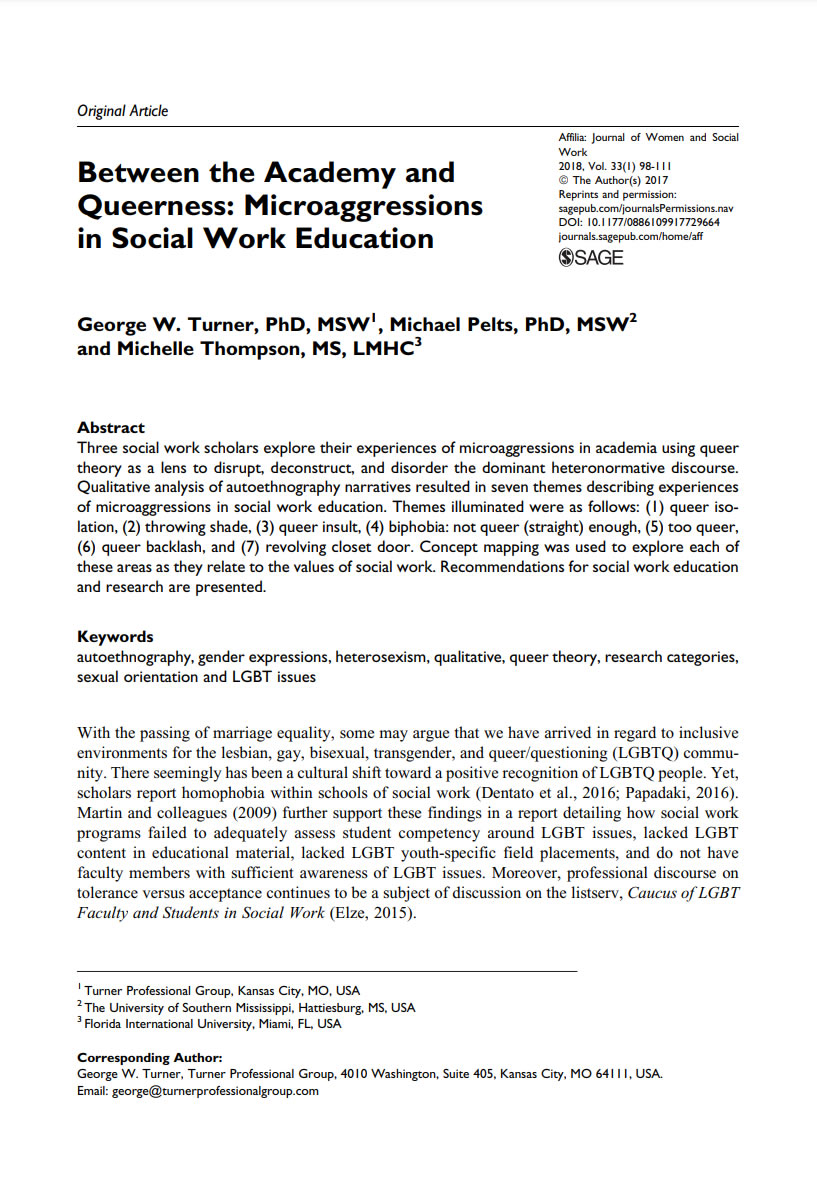
Between the Academy and Queerness: Microaggressions in Social Work Education
George W. Turner, Michael Pelts and Michelle Thompson (2018)
Three social work scholars explore their experiences of microaggressions in academia using queer theory as a lens to disrupt, deconstruct, and disorder the dominant heteronormative discourse. Qualitative analysis of autoethnography narratives resulted in seven themes describing experiences of microaggressions in social work education. Themes illuminated were as follows: (1) queer isolation, (2) throwing shade, (3) queer insult, (4) biphobia: not queer (straight) enough, (5) too queer, (6) queer backlash, and (7) revolving closet door. Concept mapping was used to explore each of these areas as they relate to the values of social work. Recommendations for social work education and research are presented.
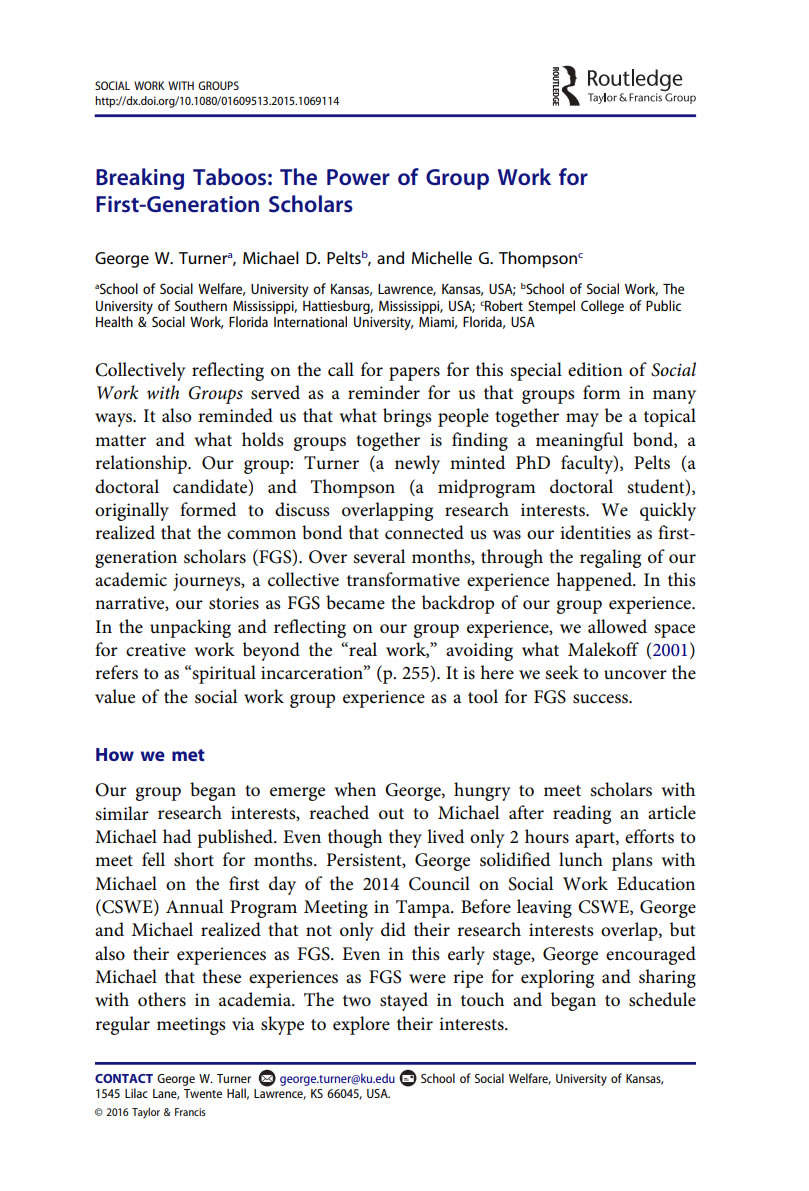 Breaking Taboos: The Power of Group Work for First-Generation Scholars
Breaking Taboos: The Power of Group Work for First-Generation Scholars
George W. Turner, Michael D. Pelts and Michelle G. Thompson (2017)
Collectively reflecting on the call for papers for this special edition of Social Work with Groups served as a reminder for us that groups form in many ways. It also reminded us that what brings people together may be a topical matter and what holds groups together is finding a meaningful bond, a relationship. Our group: Turner (a newly minted PhD faculty), Pelts (a doctoral candidate) and Thompson (a midprogram doctoral student), originally formed to discuss overlapping research interests. We quickly realized that the common bond that connected us was our identities as first generation scholars (FGS). Over several months, through the regaling of our academic journeys, a collective transformative experience happened.
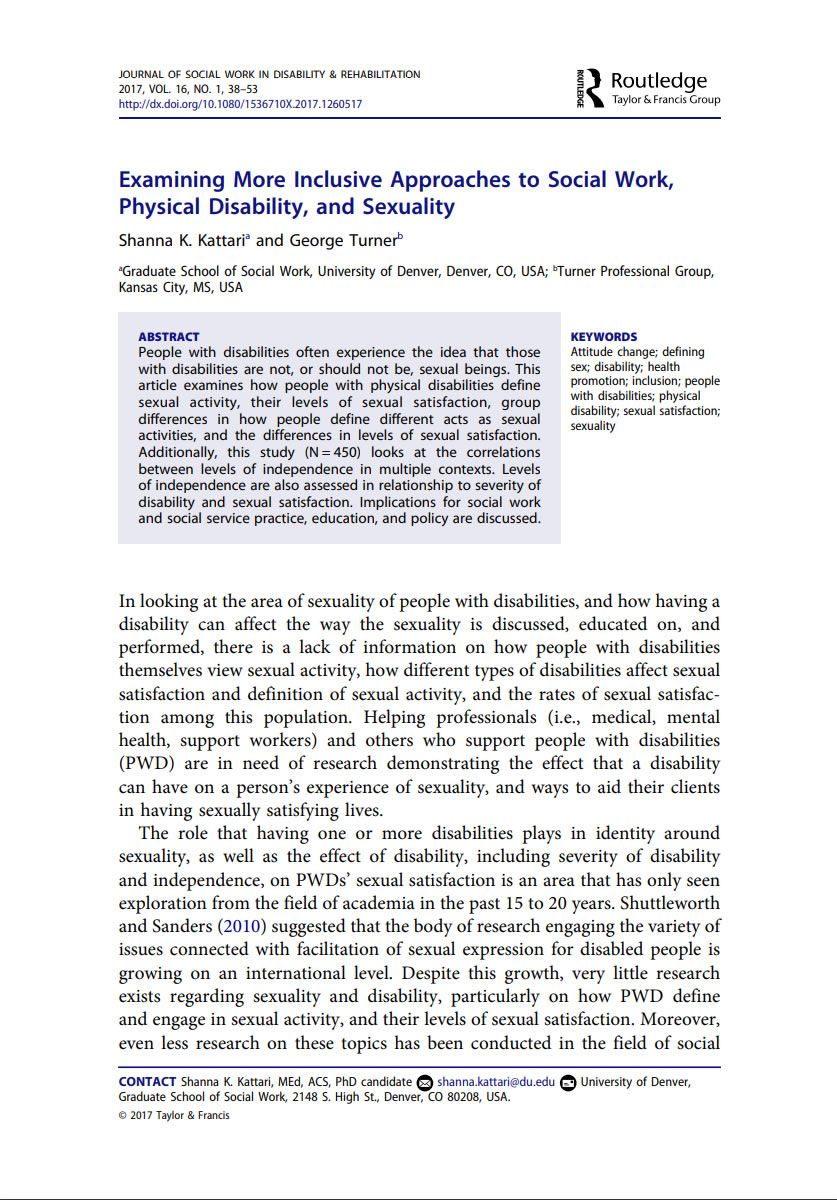 Examining More Inclusive Approaches to Social Work, Physical Disability, and Sexuality
Examining More Inclusive Approaches to Social Work, Physical Disability, and Sexuality
Shanna K. Kattaria and George W. Turner (2017)
People with disabilities often experience the idea that those with disabilities are not, or should not be, sexual beings. This article examines how people with physical disabilities define sexual activity, their levels of sexual satisfaction, group differences in how people define different acts as sexual activities, and the differences in levels of sexual satisfaction. Additionally, this study (N = 450) looks at the correlations between levels of independence in multiple contexts. Levels of independence are also assessed in relationship to severity of disability and sexual satisfaction. Implications for social work and social service practice, education, and policy are discussed.
George W. Turner and Betsy Crane (2016)
Mastery of qualitative research and its methods can be a challenge for doctoral students who often have had more academic course exposure and practical experience with quantitative research. Qualitative courses frequently provide a theoretical preliminary understanding, but it is the rich ‘‘on-the-ground’’ experience of doing research that synthesizes the learning, allowing a student to fully appreciate qualitative research as their own. This article presents the experience of a doctoral advisor and a student in the process of coaching a qualitative dissertation. Individual reflexivity, dialogic meaning making, and meeting notes from the dissertation process comprise the data sources for this inquiry. The instructor’s teaching approach is discussed as well as the student’s knowledge, values, and skills employed during the learning process.
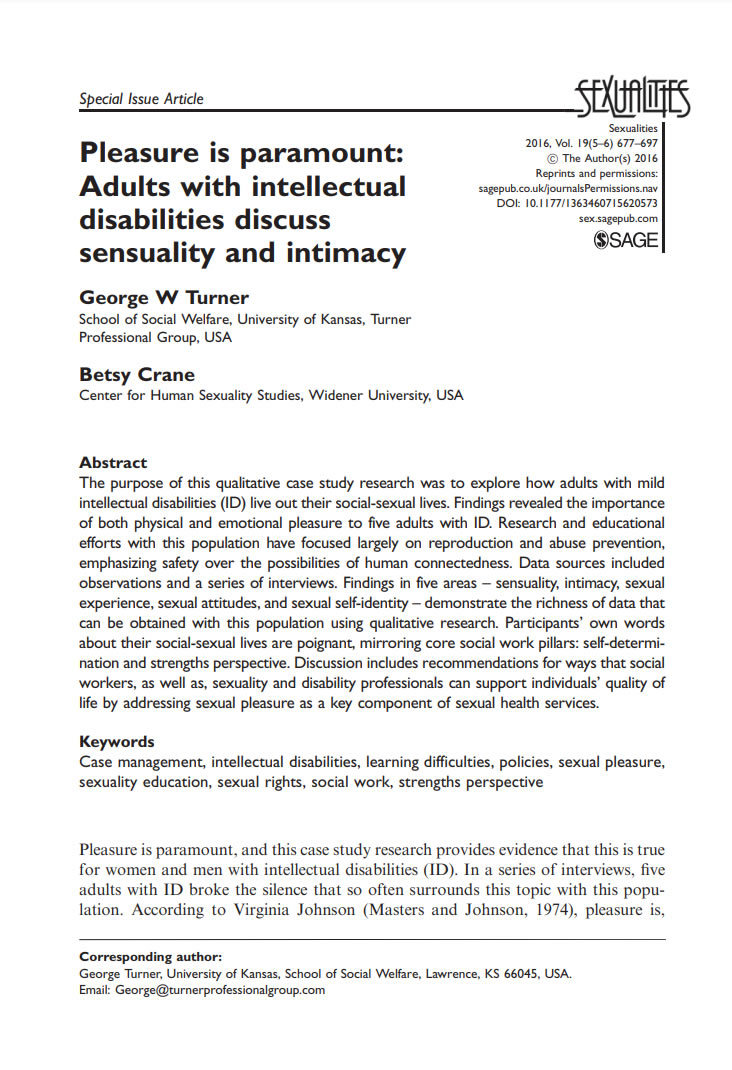 Pleasure is paramount: Adults with intellectual disabilities discuss sensuality and intimacy
Pleasure is paramount: Adults with intellectual disabilities discuss sensuality and intimacy
George W. Turner and Betsy Crane (2016)
The purpose of this qualitative case study research was to explore how adults with mild intellectual disabilities (ID) live out their social-sexual lives. Findings revealed the importance of both physical and emotional pleasure to five adults with ID. Research and educational efforts with this population have focused largely on reproduction and abuse prevention, emphasizing safety over the possibilities of human connectedness. Data sources included observations and a series of interviews. Findings in five areas – sensuality, intimacy, sexual experience, sexual attitudes, and sexual self-identity – demonstrate the richness of data that can be obtained with this population using qualitative research. Participants’ own words about their social-sexual lives are poignant, mirroring core social work pillars: self-determination and strengths perspective. Discussion includes recommendations for ways that social workers, as well as, sexuality and disability professionals can support individuals’ quality of life by addressing sexual pleasure as a key component of sexual health services.
George W. Turner and Betsy Crane (2016)
This qualitative study provides insight into the personal experiences and perceptions of adults with learning difficulties regarding their social-sexual lives. Case studies of five adults with learning difficulties based on two in-depth interviews and a home observation revealed five key elements needed to have a sexual voice: sexual self-advocacy, sexuality education, sexual script, sexual vocabulary and sexual-relational support. Social workers are encouraged to see sexual voice for adults with intellectual disabilities as a social justice issue. Challenging structural systems that contribute to marginalisation is fundamental to the efforts of social workers to advance human rights and social justice. Social work educators can increase student competency around advocacy related to disability and sexuality as well as assisting clinicians to improve their practice skills in these areas.



 Teaching and learning qualitative methods through the dissertation advising relationship: Perspectives from a professor and a graduate
Teaching and learning qualitative methods through the dissertation advising relationship: Perspectives from a professor and a graduate